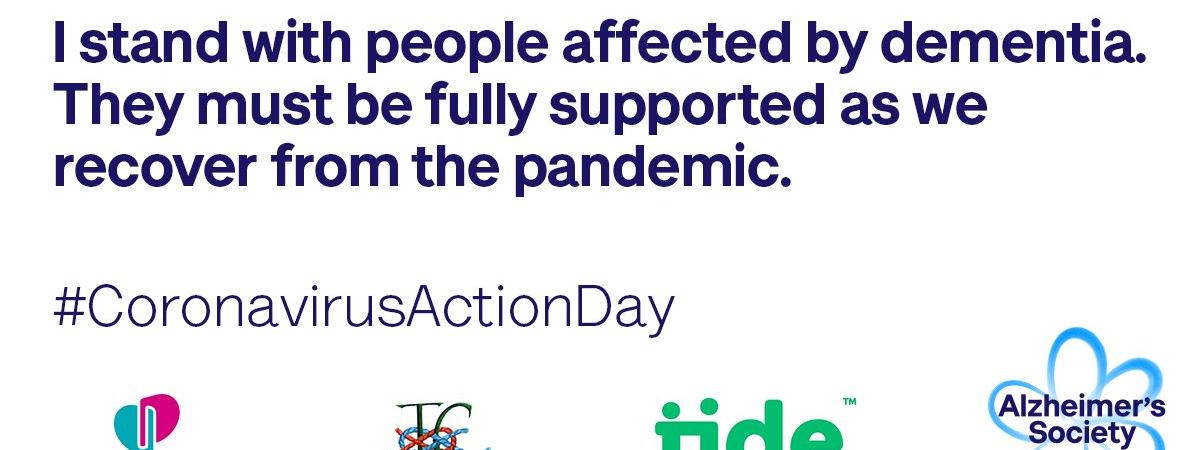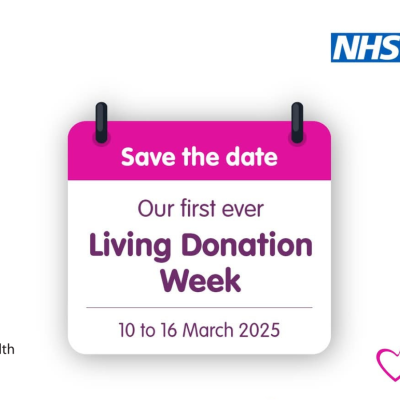
Pandemic claims the lives of more than 700 people with dementia in Northern Ireland
A staggering 700 people with dementia are estimated to have died from coronavirus in Northern Ireland since the pandemic hit the UK in full force in March 2020.1
They are among more than 34,700 with the condition to have died across England, Wales and Northern Ireland from Covid-19, making people with dementia the worst hit by coronavirus.
A coalition of dementia organisations including Alzheimer’s Society, Dementia UK, John’s Campaign and TIDE (together in dementia everyday), have come together to say never again will those affected face such hardship and loss.
Alzheimer’s Society’s investigation has shown the pandemic’s toll goes even further than deaths from the virus.
In a survey of 1,001 people who care for a family member, partner or someone close to them with dementia3, an overwhelming 92%4 said the pandemic had accelerated their loved one’s dementia symptoms; 28% of family carers said they’d seen an ‘unmanageable decline’ in their health5, while Alzheimer’s Society’s support services have been used over 3.6 million times since the pandemic began.
Alzheimer’s Society’s Dementia Connect support line has been flooded with calls from relatives revealing how quickly their loved ones are going downhill, losing their abilities to talk or feed themselves.
Nearly a third (32%) of those who lost a loved one during the pandemic thought that isolation/lack of social contact was a significant factor in that loss.6
People with dementia in care homes have been cut off from their loved ones for almost a year, contributing to a massive deterioration in their health.
A third (31%) reported a more rapid increase in loved ones’ difficulty speaking and holding a conversation, and quarter (25%) in eating by themselves.7
Only 13% of people surveyed have been able to go inside their loved one’s care home since the pandemic began. Almost a quarter (24%) haven’t been able to see their loved one at all for over six months.8
There are an estimated 850,000 people living with dementia in the UK, including more than 22,000 in Northern Ireland.
Dementia organisations, including this coalition, joined forces as One Dementia Voice in July 2020 to call for designated family carers to be given key worker status to enable care home visits to loved ones.
Family carers are integral to the care system, and to the people for whom they care - it’s they who know how to get their loved ones to eat, drink, take medicine - and are often the first to know when something is wrong.
The pandemic has not just hit those in care homes. With 470,000 people with dementia living in the community, many are reliant on unpaid family carers for support. 42% of these carers say lockdown has caused a rapid increase in feelings of depression in their loved one, while over half (54%) say they’ve seen a rapid loss of memory.9 Carers themselves have been hugely affected – seven out of 10 (73%) say that the last year has negatively impacted their mental and physical health with anxiety (42%) and exhaustion (34%) the most cited symptoms.10 Over half (54%) saying that the pandemic has left them feeling less able to care for their loved one.11
Barney Thompson, 67, who lives in Toomebridge with his wife Catherine, was diagnosed with Lewy body dementia when he was 64.
The former traffic policeman won the ‘Trailblazer of the Year Award’ at the 2019 Dementia Friendly Awards for the work he did helping make public spaces more dementia friendly.
Lockdown has been very stressful for the couple, as Barney has been shielding because he has diabetes.
The isolation from his daughters, Sophie a stage manager who lives in Northern Ireland and Amy who is a doctor at the London Free Hospital, has led to a deterioration in Barney’s condition.
“We are both very aware we’re not getting this time back,” said Catherine. “We’ve lost that now. We were supposed to go on holiday after our youngest daughter graduated, but that time has passed.
“Amy was due to come home for Christmas and then Boris Johnson called that off at the 11th hour. It was awful for all of us, but Barney devastated. He asked me ‘will I remember them next Christmas?’.
At the beginning of lockdown Barney felt his cognitive abilities were beginning to slip and he took the difficult decision to stop driving.
“It’s led to even more isolation. I can’t just get in the car and go to a place and meet people I know,” he said. “It’s cut me off from everything. I don’t have the freedom to just do something.”
The couple are now hoping for a return to normality soon.
“We’ve been let down so badly,” said Catherine. “But now there is a glimmer of hope.”
Bernadine McCrory Northern Ireland Country Director at Alzheimer’s Society said:
“Coronavirus has shattered the lives of so many people with dementia, worst hit by the pandemic - lives taken by the virus itself, and many more prematurely taken due to increased dementia symptoms and, in part, loneliness. Each one leaves behind a grieving family.
Family carers, too, have been buckling under the strain. We urge the Government to support people affected by dementia whose lives have been upended, putting recovery plans in place, but also making the legacy of Covid-19 a social care system that cares for the most vulnerable when they need it.”
Alzheimer’s Society, Dementia UK, John’s Campaign and TIDE (together in dementia everyday) are calling for:
- A Recovery Plan with the needs of people affected by dementia at their heart.
- An end to blanket bans on care home visits where there is no active outbreak.
- A recognition that family carers are integral to the care system.
- Family carers to register their carer status with GP surgeries to ensure they get vaccination priority.
- Universal social care that we can all be proud of, free at point of use, like the NHS, like education – and providing quality care for every person with dementia who needs it.
Alzheimer’s Society’s Dementia Connect Support line – 0333 1503456 – is available seven days a week, providing information and practical support for people affected by dementia.

Alzheimer's Society
Alzheimer's Society NI National Office
30 Skegoneill Street
Belfast
BT15 3JP
United Kingdom



